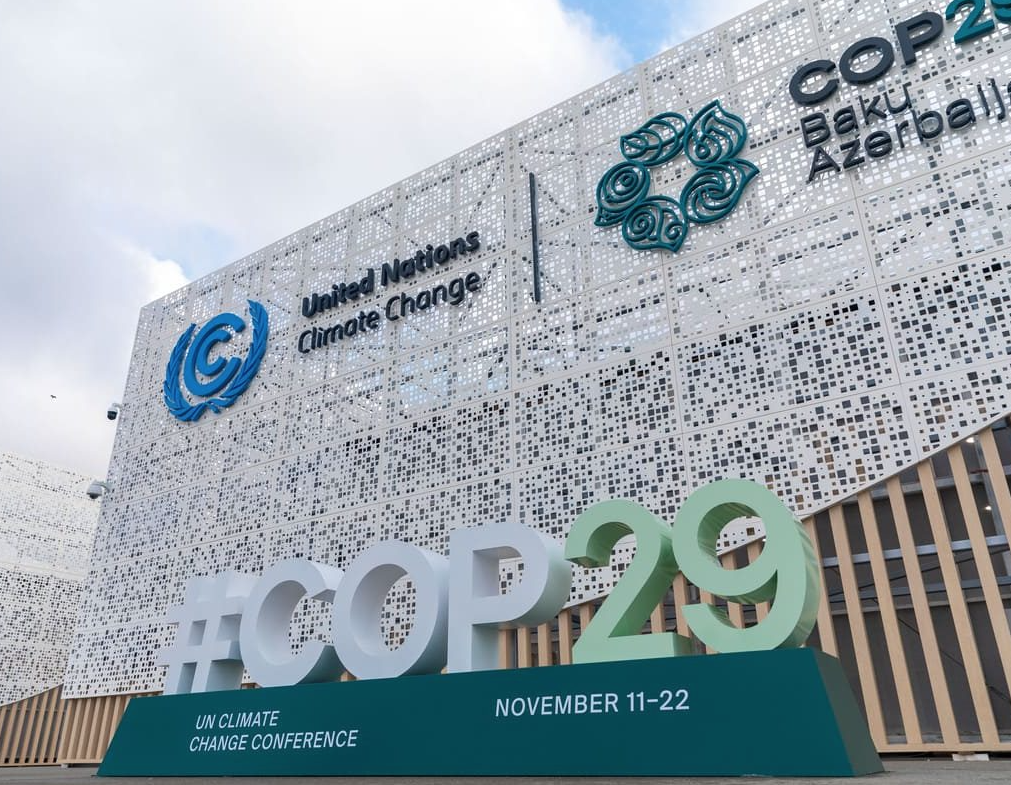
“Let’s dispel any idea that climate finance is charity. A new, ambitious climate finance goal is in the interest of every single nation, including the largest and wealthiest.” With these words, Simon Stiell, Secretary of the UNFCCC, opened the Baku climate summit on November 11, capturing what’s at stake at COP29 in Azerbaijan.
UN Secretary-General Antonio Guterres added weight to this message at the summit’s inauguration: “Those who deny the end of the fossil fuel era will lose out,” he said, noting that “solutions have never been cheaper and more accessible.” For Mukhtar Babayev, Azerbaijan’s president of COP29, the Baku summit is “a moment of truth for the Paris Agreement.”
Approximately 51,000 accredited delegates are attending COP29, including many NGO and civil society representatives. Several NGOs are critical of the choice to host the climate summit once again in a fossil-fuel-reliant country, as was the case with COP28 in the United Arab Emirates.
The Setting for COP29 in Baku
The COP29 summit in Azerbaijan aims to keep within reach the Paris Agreement’s most ambitious goal: limiting global warming to 1.5°C above pre-industrial levels, a target slipping from our grasp. In 2023, global emissions increased by 1.3%, when they should decline by 43% from 2019 levels by 2030 to stay on track. UNEP’s latest Emissions Gap Report states that meeting Paris targets is still “technically feasible,” but it calls for urgent action and drastic changes. To achieve necessary emissions reductions, greenhouse gases must drop by 7% annually until 2030.
The summit in Baku builds on achievements from COP28 in Dubai last year, where countries recognized for the first time the need to “transition away from fossil fuels” and agreed on goals for 2030, including tripling renewable capacity and doubling energy efficiency. However, the commitment to phase out fossil fuels remains ambiguous, stopping short of a binding “phase out” or even a clearer “phase down.”
COP29 Program Agenda
As customary, COP29 in Baku features a program with daily themes, set by Azerbaijan as the presiding country to focus attention on specific issues. The schedule is as follows:
- Monday, November 11: Conference opening.
- Tuesday and Wednesday, November 12-13: World Leaders Climate Action Summit, focusing on concrete climate actions.
- Thursday, November 14: Focus on finance, investment, and trade.
- Friday, November 15: Energy, peace, aid, and recovery.
- Saturday, November 16: Science, technology, innovation, and digitalization.
- Monday, November 18: Human capital, youth, health, and education.
- Tuesday, November 19: Food, agriculture, and water.
- Wednesday, November 20: Urbanization, transportation, and tourism.
- Thursday, November 21: Nature and biodiversity, Indigenous peoples, gender equality, oceans, and coastal areas.
- Friday, November 22: Final day, with concluding negotiations; if needed, talks may extend into the weekend.
Climate Finance and the NCQG
A central focus at COP29 is climate finance—the funds that wealthy nations must provide to poorer countries to combat climate impacts. The current commitment of $100 billion annually is seen as insufficient, with developing countries pushing to increase this to at least $1 trillion per year by 2035. Negotiations are challenging, as countries must agree on who should pay, how much, and according to which criteria, aiming to establish a new Quantified Collective Goal (NCQG). There will also be discussions on funding for recovery from climate disasters (the Loss and Damage mechanism) and adaptation finance.
The Shadow of a Possible Trump Presidency
Adding complexity is the potential return of Donald Trump to the U.S. presidency. In 2016, Trump promised to withdraw the U.S. from the Paris Agreement, which he succeeded in doing in 2020. This year, he has again pledged to exit the Agreement and even consider leaving the UNFCCC, the UN body overseeing climate negotiations. The Wall Street Journal reports that Trump may already have an executive order prepared to withdraw from Paris, which he could sign on his first day in office, January 20, 2025.
During the campaign, Trump also hinted at rolling back U.S. climate commitments, which could stall global climate progress if other countries follow suit.
Limited Participation by World Leaders
COP29 in Azerbaijan faces lower attendance by key world leaders. President Biden, Vladimir Putin, European Commission President Ursula von der Leyen, and leaders of France, Germany, Brazil, India, and China are all absent. Approximately 100 out of 195 leaders have confirmed their participation. Leaders’ presence often helps break stalemates on tough issues, as high-level negotiations can untangle months of technical discussions. Lower-level representatives may lack the authority to make bold decisions, limiting flexibility in the talks.
Some countries, like Papua New Guinea, have withdrawn altogether, labeling COP29 as a “waste of time.” Without decisive action, the rise in sea levels caused by global warming will threaten the very existence of Pacific island nations.
2024: The Hottest Year on Record
COP29 is seen by many as one of the last opportunities to prevent global temperatures from exceeding the 1.5°C threshold. Just before the conference, the Copernicus system declared 2024 virtually certain to become the hottest year on record, likely surpassing 1.5°C for the first time. While a sustained 1.5°C rise over 30 years would officially breach the Paris Agreement, temperatures are currently about +1.3°C above pre-industrial levels.
Opening COP29, World Meteorological Organization Secretary-General Celeste Saulo reminded delegates that while the 1.5°C threshold hasn’t been breached yet, achieving the Paris goals remains precarious.